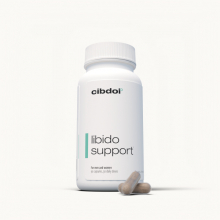What affects libido the most?
Published:
Having a healthy libido is important for overall wellbeing and sexual satisfaction. But many factors can affect your libido, both positively and negatively. Understanding the most impactful influences on libido can help you make lifestyle changes to optimize your sex drive.
Contents:

Hormones play a major role
Hormone levels have a significant effect on libido for both men and women.
Testosterone is the key hormone that boosts sex drive in men. Low testosterone levels can decrease libido. Conditions like hypogonadism, which causes low testosterone, can greatly reduce a man's sex drive.
For women, estrogen and progesterone levels affect sexual desire. Lower estrogen levels during perimenopause and menopause often cause a woman's libido to drop.
Thyroid issues like hypothyroidism or hyperthyroidism also influence hormone production. An overactive or underactive thyroid gland can disrupt levels of testosterone and estrogen.
Are you getting enough sleep?
Not getting adequate sleep has a negative domino effect on libido. Fatigue reduces energy levels and motivation for sex.
Long-term sleep deprivation also disrupts hormone regulation. Testosterone production drops when you don't get enough sleep. And studies show cortisol levels spike, which can lower libido.
Aim for 7-9 hours of quality sleep per night. Improve your sleep hygiene by sticking to a schedule, limiting screen time before bed, and creating an optimal sleep environment.
Stress and mental health play a role
Psychological factors like stress, anxiety, and depression commonly inhibit libido. Mental health issues make it difficult to get in the mood for sex.
Chronic stress elevates cortisol levels, which reduces testosterone production.
Finding healthy ways to manage stress through exercise, meditation, social connection, or therapy can help minimize the libido-lowering effects.
Medical conditions affect libido
Certain medical conditions and their treatments can negatively impact sex drive.
Diabetes often contributes to sexual dysfunction like low libido in both men and women. Poor blood sugar control can damage nerves and blood vessels needed for optimal sexual response.
Cardiovascular disease limits blood flow, which can inhibit arousal. Certain blood pressure and heart medications like beta-blockers can also cause sexual problems.
Arthritis, chronic pain, cancer, and neurological conditions also commonly affect libido and sexual function.
Unhealthy lifestyle habits hamper libido
Leading an unhealthy lifestyle can eventually take a toll on your sex drive. Lack of physical activity, poor diet, and excess alcohol intake negatively influence libido.
Obesity and being overweight reduce testosterone levels and sexual desire.
Smoking constricts blood vessels and impairs blood flow necessary for arousal.
Drinking too much alcohol can lower testosterone production, decrease sexual desire, and make it harder to become aroused.
How to improve low libido
If your libido needs a boost, focus on addressing any underlying causes. Talk to your doctor to rule out any medical conditions impacting your sex drive.
Optimize your hormones through diet, exercise, stress management, and proper sleep. Avoid smoking and excess alcohol. Stay socially and mentally engaged to lift your mood.
Consider libido-enhancing supplements like maca, tribulus, zinc, and fenugreek. Herbal remedies like ginseng, yohimbine, and ginkgo may also help.
Don't hesitate to seek professional help from a therapist if relationship issues or mental health concerns are interfering with your sex life.
Summary
Libido levels fluctuate over time due to hormonal changes, health status, stress levels, medications, and lifestyle factors. Paying attention to what specifically impacts your sex drive makes it possible to find solutions to reclaim a satisfying libido.
Frequently Asked Questions About Libido
What is libido?
Libido refers to a person's overall sexual drive or desire for sexual activity. It governs both spontaneous desire and response to sexual stimulation. Libido varies between individuals and can fluctuate over time.
What factors affect libido?
Many factors can impact libido, including:
- Hormones: Changes in testosterone, estrogen, and progesterone significantly influence libido.
- Medical conditions: Chronic illnesses like diabetes, heart disease, cancer, and arthritis often affect libido.
- Medications: Certain prescription drugs, like antidepressants and blood pressure medications, can inhibit sex drive.
- Mental health: Stress, anxiety, and depression commonly reduce libido.
- Sleep quality: Fatigue and sleep deprivation lower libido by disrupting hormone regulation.
- Diet: Poor nutrition negatively impacts energy levels and hormonal balance. Obesity is also linked to lower testosterone.
- Exercise: Lack of physical activity can contribute to low libido. Exercise helps manage weight, boost energy, and balance hormones.
- Alcohol and smoking: Excessive drinking and smoking constrict blood vessels, impairing arousal. Both habits also reduce testosterone production.
How do hormones affect libido?
Sex hormones like testosterone, estrogen, and progesterone directly influence sexual desire and functioning:
- Testosterone plays a major role in regulating male libido. Low testosterone, or hypogonadism, substantially reduces a man's sex drive.
- Estrogen levels drive libido in women. Reduced estrogen during perimenopause and menopause leads to vaginal dryness and decreased libido.
- Progesterone influences female sexual desire and arousal. Changing progesterone levels during the menstrual cycle impact a woman's libido.
Can medications lower libido?
Yes, certain prescription medications are known to potentially decrease libido by affecting hormone levels, blood flow, or mental health:
- Hormonal birth control with high progesterone can inhibit libido in some women.
- Antidepressants like SSRIs and MAOIs have libido-lowering effects for both men and women.
- High blood pressure medications including diuretics and beta blockers can make it difficult to get aroused.
- Some fibromyalgia and anti-seizure medications also list lowered libido as a side effect.
How does obesity affect libido?
Obesity and being overweight tend to decrease libido through several mechanisms:
- Excess fat tissue elevates the conversion of testosterone to estrogen, reducing testosterone levels.
- Inflammation caused by obesity can damage blood vessels and restrict blood flow necessary for arousal.
- Obesity increases risk for medical conditions like diabetes and heart disease which impact sexual functioning.
- Excess weight can negatively affect body image, self-esteem, and desire for sex.
Losing weight through diet and exercise helps balance hormones, improve self-confidence, and reduce obesity-related health problems.
What lifestyle changes can improve libido?
Adopting healthier lifestyle habits represents one of the safest, most sustainable ways to optimize libido:
- Get regular exercise to reduce stress, boost energy and self-esteem, aid weight loss, and balance hormones.
- Eat a nutritious, balanced diet high in lean proteins, healthy fats, and fresh produce to fuel the body.
- Manage stress through yoga, meditation, massage, counseling, or other relaxation techniques.
- Improve sleep quality by sticking to set sleep/wake times and limiting alcohol and screen time before bed.
- Quit smoking to enhance blood flow and cardiovascular function.
- Drink alcohol only in moderation to avoid disrupting hormone levels.
When should you see a doctor about low libido?
Consult a doctor if low libido persists and interferes with relationships or quality of life. A medical evaluation can identify any underlying conditions contributing to reduced sex drive. Blood tests can check hormone levels. Based on the cause, treatment may involve counseling, medications, supplements, lifestyle changes, or addressing medical issues.















